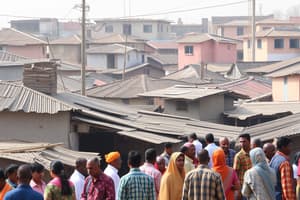Podcast
Questions and Answers
What is culture?
What is culture?
The shared beliefs, values, norms, and practices of a group.
Match the components of culture with their definitions:
Match the components of culture with their definitions:
Language = Primary means of communication and cultural transmission Symbols = Objects or actions that hold particular meaning Rituals = Established procedures or ceremonies that foster community Values and Norms = Standards that guide behavior
Cultural diversity refers to the uniform practices across different societies.
Cultural diversity refers to the uniform practices across different societies.
False (B)
What is society?
What is society?
Which of the following are components of social structure? (Select all that apply)
Which of the following are components of social structure? (Select all that apply)
What is the definition of politics?
What is the definition of politics?
What type of political system derives power from the consent of the governed?
What type of political system derives power from the consent of the governed?
Totalitarianism is a mild form of authoritarianism.
Totalitarianism is a mild form of authoritarianism.
What term describes the set of attitudes and beliefs that shape political behavior?
What term describes the set of attitudes and beliefs that shape political behavior?
Cultural values influence _____ systems and social institutions.
Cultural values influence _____ systems and social institutions.
Study Notes
Culture
- Definition: The shared beliefs, values, norms, and practices of a group.
- Components:
- Language: Primary means of communication and cultural transmission.
- Symbols: Objects or actions that hold particular meaning (e.g., flags, art).
- Rituals: Established procedures or ceremonies that foster community (e.g., weddings, festivals).
- Values and Norms: Standards that guide behavior; can be explicit or implicit.
- Cultural Diversity: Variation in cultural practices and perspectives across different societies.
- Cultural Change: Can occur through innovation, diffusion (spread of cultural traits), or social movements.
Society
- Definition: A structured community of people bound together by similar traditions and institutions.
- Social Structure:
- Institutions: Established systems (e.g., family, education, economy) that meet society's needs.
- Social Stratification: Hierarchical organization of individuals based on wealth, power, and prestige.
- Socialization: The process through which individuals learn and internalize the values and norms of their society.
- Collective Behavior: Actions taken by a group in pursuit of a shared goal, including social movements and public protests.
Politics
- Definition: The process of making decisions that apply to members of a group or society.
- Political Systems:
- Democracy: Power derived from the consent of the governed, typically through elections.
- Authoritarianism: Concentration of power in a leader or small group, often lacking democratic processes.
- Totalitarianism: Extreme form of authoritarianism; seeks to control all aspects of public and private life.
- Political Culture: The set of attitudes, beliefs, and sentiments that shape the political behavior of a society.
- Power and Authority:
- Power: The ability to influence or control the behavior of people and institutions.
- Legitimacy: The recognized right to hold power, often based on legal or social norms.
- Political Ideologies: Frameworks that guide political beliefs and policies (e.g., liberalism, conservatism, socialism).
Interconnection of Culture, Society, and Politics
- Cultural values influence political systems and social institutions.
- Societal structures can both reflect and shape cultural norms.
- Political decisions and policies can alter cultural practices and societal relations.
Culture
- Culture encompasses the shared beliefs, values, norms, and practices that define a group.
- Language serves as the primary medium for communication and the transfer of cultural knowledge.
- Symbols, such as flags and art, represent significant meanings within a culture.
- Rituals, including weddings and festivals, foster community cohesion through established ceremonies.
- Values and norms guide societal behavior, existing as either explicit laws or implicit expectations.
- Cultural diversity highlights the differences in practices and perspectives among various societies.
- Cultural change may arise from innovation, diffusion of cultural traits, or social movements advocating for change.
Society
- Society is a structured community where individuals share similar traditions and institutions.
- Social structure comprises institutions like family, education, and economy that fulfill societal needs.
- Social stratification organizes individuals hierarchically based on wealth, power, and prestige.
- Socialization is the ongoing process through which people learn and assimilate societal values and norms.
- Collective behavior refers to group actions united towards a common goal, encompassing social movements and protests.
Politics
- Politics involves decision-making processes that impact group members or society as a whole.
- Democratic systems grant power based on the consent of the governed, usually via elections.
- Authoritarianism centralizes power within a leader or small group, often dismissing democratic methods.
- Totalitarianism represents an extreme authoritarian regime, controlling all facets of public and private life.
- Political culture shapes how political behaviors and sentiments manifest within a society.
- Power is defined as the capacity to influence the actions of individuals and institutions.
- Legitimacy refers to the accepted right to exercise power, typically relying on legal and social norms.
- Political ideologies provide frameworks for political beliefs and policies, including liberalism, conservatism, and socialism.
Interconnection of Culture, Society, and Politics
- Cultural values significantly impact political systems and shape social institutions.
- Societal structures both reflect and influence cultural norms and expectations.
- Political decisions and policies have the power to transform cultural practices and affect social relations.
Studying That Suits You
Use AI to generate personalized quizzes and flashcards to suit your learning preferences.
Description
Test your understanding of the fundamental concepts of culture and society. This quiz explores components like language, symbols, rituals, and social structures. Delve into cultural diversity and the implications of cultural change and social stratification.




